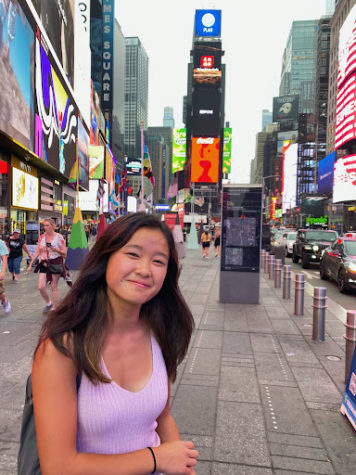Kamala Harris Makes History as First Black and South Asian Female to Receive a Nomination for Vice President
September 4, 2020
California Sen. Kamala Harris made history Tuesday, Aug. 11, as the first woman of color to accept the nomination for the Democratic party as the vice president of the United States.
Harris is now the most recent pick of a short list of women nominated for the position of vice president by a major political party. In 1984, Geraldine Ferraro was selected by the Democratic Party as the vice presidential nominee. A couple of decades later in 2008, Sarah Palin was nominated by the Republican Party. Harris is now the first Black, South-Asian female to receive a nomination for vice president.
Wednesday, Aug. 19, the third night of the Democratic National Convention, Harris delivered her acceptance speech as she joined forces with presidential candidate and former Vice President Joe Biden. “In its emphasis on women and minorities, Wednesday’s program reflected a major effort by Democrats to showcase diversity in the country and the multiracial coalition they hope will lift Biden, a 77-year-old White man, to the White House amid a moment of racial reckoning,” the Washington Post wrote in an article regarding Harris’s speech.
In the introduction of her speech, Harris shared her family and life story. Harris’ mother, Shyamala Gopalan Harris, immigrated from India to the United States when she was 19 years old, to pursue her goal to cure cancer. She attended UC Berkeley, where she met Harris’s father Donald Harris, a Jamaican immigrant who came to the United States to study economics. Both parents were civil rights activists, paving Harris’s future in law as a prosecutor. “In the streets of Oakland and Berkeley, I got a stroller’s-eye view of people getting into what the great John Lewis called ‘good trouble,’ ” Harris said.
Harris recognized her mother as a powerful role-model who taught her about gender and racial equality. “I thought it was smart how she explained how her early life was surrounded by powerful women who influenced her and motivated her,” junior Tom Inouye said.
Acknowledging her childhood in many areas of her speech, Harris claimed that the environment she was surrounded with shaped her to who she has become today. “Those early experiences had a formative impact on Ms. Harris’s professional path, pushing her away from the outsider politics of her childhood and into the Democratic establishment that she came to believe had greater power to effect change,” the New York Times wrote in an article titled Kamala Harris, a Political Fighter Shaped by Life in Two Worlds.
Harris notes that her career took off after receiving a strong education at a young age. “That led me to become a lawyer, a District Attorney, Attorney General, and a United States Senator,” Harris said. She currently holds multiple additional titles of “firsts” for positions she has held throughout her career, with her South Asian-American and African American heritage.
Regardless of whether or not Americans support her ideas, track record as a prosecutor, or plans for the country, America recognizes Harris’s unprecedented position that has taken America one step forward in reaching racial and women’s equality.








